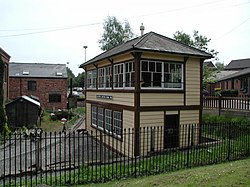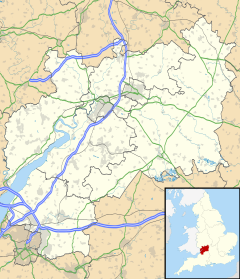Coleford, Gloucestershire
| Coleford | |
|---|---|
 Coleford Market Place |
|
 Coleford Railway Museum |
|
| Coleford shown within Gloucestershire | |
| Population | 8,359 (2011) |
| OS grid reference | SO5710 |
| District | |
| Shire county | |
| Region | |
| Country | England |
| Sovereign state | United Kingdom |
| Post town | COLEFORD |
| Postcode district | GL16 |
| Dialling code | 01594 |
| Police | Gloucestershire |
| Fire | Gloucestershire |
| Ambulance | South Western |
| EU Parliament | South West England |
| UK Parliament | |
Coleford is a small market town in the west of the Forest of Dean, Gloucestershire, England, two miles east of the Welsh border and close to the Wye Valley. It is the administrative centre of the Forest of Dean district. The population at the 2011 census was 8,359.
There are two electoral wards in Coleford. Their total area and population equal that quoted above.
Coleford was originally a tithing in the north-east corner of Newland parish. The settlement grew up (as its name suggests) at a ford through which charcoal and iron ore were probably carried. By the mid 14th century hamlets called Coleford and Whitecliff had grown up along the road in the valley of Thurstan's brook. Coleford had eight or more houses in 1349 and was described as a street in 1364. It had a chapel by 1489. In 1642 the commander of a parliamentary garrison in Coleford started a market in the town because the nearest chartered market, in Monmouth, was under royalist control.
Coleford saw some action during the English Civil War. On 20 February 1643, Lord Herbert, the Earl of Worcester's eldest son, and the King's Lieutenant-General of South Wales, marched through Coleford heading for Gloucester, at the head of an army of 500 horse and 1500 foot. At Coleford their progress was impeded by a troop of Parliamentarians under Colonel Berrowe, aided by a disorderly group of country people. A skirmish ensued, during which the market-house was burnt, and Major-General Lawley, who commanded the foot, with two other officers, were shot dead from a window. Colonel Brett was then put in command of the foot, Lord John Somerset continuing at the head of the horse. The Royalists forced a passage through, after capturing Lieutenant-Colonel Winter, together with some other officers and soldiers, and so, putting the Parliamentarians to flight, marched unimpeded for Gloucester.
...
Wikipedia

